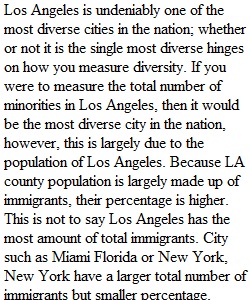


Q Welcome to our second round of Trust Exercises! Here's how it works! The Schedule: WEEK EIGHT - by the end of Week Eight, one member of your group will post your group's second presentation to this discussion board, including the list of the names of everyone who worked on the presentation. The presentation will be a coherent, edited report (three paragraphs should do it). It need not be formal but it must reference any sources used and include, at least, an informal list of works cited. The presentation should not be made up of paragraphs from different group members that are squished together or contain unattributed first-person perspective (unless you've truly become that close!). It should read as if written in one voice and be edited for grammar and spelling. The full prompt appears below. WEEK NINE - by the end of Week Nine, I ask that each of you respond to at least two of the presentations other groups have posted here. You'll do this as yourself/an individual, not as a part of your group. The instructions for this round: This is our second of four presentations. As before, you might think of these as mini-essays and doing so will be the best way to practice for our essays/research paper. Regardless, if your group would prefer to present in non-essay form, as discussed with Trust Exercises I, that is welcome. If your group elects to present in an alternate way, it will still need to submit a short written explanation as well as an informal list of works cited. Our remaining presentations will focus on the aspect of Los Angeles covered in your first presentation from a new perspective. Address what follows fully, answering any questions it poses, and, add any other details that your group finds relevant. Start with what I have offered and then make it your own. Please be sure to consider the notes offered to your group's first report (on the Trust Exercises I discussion board) before you begin. 1-2 Paragraphs: In the first presentation, you told us about your topic from an observer's perspective (though, of course, many of us are impacted by the issues and topics related in round one, making us more than observers). For this round, I'd like you to consider the counterargument, if you will, to that perspective. That is, please share one or two paragraphs written from the perspective of the person(s) responsible for the issue. No one acts alone, I'm not asking that you create a super villain here (but a covey of villains might do it, if your topic suggests this), but I am asking that you step into the shoes of whomever might be considered the creator/to blame for the topic you are covering. If this means you will be writing from the perspective from an entity you are tempted to think of as evil, remember where we are: Hollywood. Think like an actor. Find the motivation. Any actor worth their salt knows that in order to play an effective villain, they must find the desire, the unmet need, that precipitates the unwholesome choice. So, for example, only a cartoon is evil without reason. Only Scrooge McDuck thinks, "I do greedy things because I am a greedy duck." Those we consider to be people have more depth. If Idris Elba were playing Scrooge McDuck, McDuck would move from caricature to person as we began to understand that McDuck does evil things because of a deep wound in his duck heart. \ Idris Elba (and Jason Statham) on acting in one of the films with the fast cars and etc (8 minutes). I hope you'll consider Elba's advice for playing the "bad guy," and work some eyebrow action into your group's presentation. Just kidding! Seriously, do consider what Elba says here about how his character would explain his choices to his mother. This is a great tool for stepping into the shoes of a person or persons for whom you do not, yet, feel empathy. An empathetic counterargument is a winning counterargument. If your group's focus is not a problem, and so, there is no villain, great. The work is the same in that the person(s) you are representing should have dimensionality and depth. Everyone is motivated, in some way, by their own needs, even the good ones. 1 Paragraph: And then, tell us about your group, but this time, I'd like your group to pick a Los Angeles landmark to represent its experience of itself so far. How you define "landmark," much as we are doing in the Field Trip assignment, is up to you. It can exist in any time and be something everyone can access or a private scene known only to your group. Describe it to us and tell us a bit about why you've chosen it. Think of this as a group exercise to help prepare you for our upcoming essay. This round of presentations is due at the end of Week Eight. Working together is the ultimate goal of this assignment. Presentations posted by individuals alone will not be graded. Work with your group! At any point you are welcome to reference the Choi text, Trust Exercise, or any of the other texts we've discussed (remember to cite them if you do). I look forward to reading your presentations!
View Related Questions